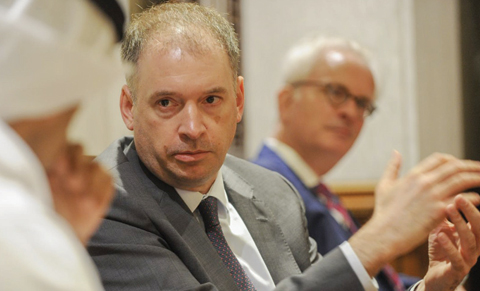Minister stresses need to support Iraq after defeat of IS
 Niels Annen
Niels AnnenKUWAIT: Kuwait has shown a remarkable engagement with Iraq, offering multifaceted assistance and recently hosting a reconstruction conference pledging billions of dollars to the fellow Arab country, in addition to contributions and commitment to regional stability and security, a German official said. Niels Annen, Minister of State at the Foreign Ministry, said he believed Kuwait "is really remarkable" in its engagement towards helping Iraq at political and humanitarian levels.
"Kuwait has been the victim of an (Iraqi) aggression and is now providing the platform for reconstruction and reconciliation" in Iraq, Annen said in an interview, referring to the Iraqi 1990-91 invasion and seven-month occupation of the Gulf State. Kuwait hosted Iraq's reconstruction conference last February. Donor countries, non-governmental organizations (NGOs) and international financial institutions pledged $30 billion to help rebuild the country, specially areas liberated from so-called Islamic State (IS).
Aside from the conference, Kuwait government and charitable societies have been at the forefront in offering humanitarian aid for the needy Iraqi people. Annen met yesterday with National Assembly Speaker Marzouq Al-Ghanem and Deputy Foreign Minister Khaled Al-Jarallah to discuss economic cooperation. He said his visit to Kuwait, the first in his capacity as minister, also aimed at underlining "our support" for His Highness the Amir Sheikh Sabah Al-Ahmad Al-Jaber Al-Sabah's mediation efforts to finding a "political solution" for the Gulf crisis.
Germany's relations with Kuwait and the Gulf Cooperation Council (GCC) as a whole are important, he noted. "We share the concern of His Highness the Amir that this (crisis) could affect unity of the GCC," said Annen. On Iraq, Annen said it was important to support the Iraqi government following the defeat of IS.
The global coalition fighting IS also pursuing remaining pockets of the terror organization in Iraq and neighboring Syria, which include many foreign fighters who posed a real threat when they return to their countries of origin, including Germany. However, the European country is well prepared for them, said Annen. Germany was also helping Iraq by providing expertise in de-mining, for example, or rehabilitation of infrastructure like sewers. This is in addition to training operations for the Kurdish Peshmerga forces in northern Iraq.
Syrian crisis
On Syria, Annen expressed concern at the "pattern of warfare by the Syrian regime" which was following a policy that starve people, bombarding populated areas with cluster bombs and recently the use of chemical weapons, triggering global outrage. UN Security Council failed, due to a Russian veto earlier last month, to adopt a draft resolution that would have launched an inquiry into use of chemical weapons against civilians in Eastern Ghouta, Syria.
Annen meanwhile said Germany was contributing to humanitarian efforts to helping the Syrian people. "We increased our support for (the UN refugee agency) UNHCR and World Food Program (WPF)" to also help the Palestinian refugees living in Syria. The German government is also working to help maintain stability of neighboring countries to make sure the conflict in Syria is not affecting stability of Lebanon and Jordan, explained Annen.
Germany, which accepted many refugees from Syria, has provided a significant amount of financial aid and expertise to help host nations - Lebanon, Jordan and Turkey - better deal with growing needs of Syrian refugees, he said.
Iran's nuclear agreement
Asked about Iran's nuclear agreement, the German minister said the deal was meeting its objectives, curbing the Islamic Republic's nuclear program. International Atomic Energy Agency's (IAEA) experts concluded the 2015 nuclear agreement, which took around 13 years to conclude, has been implemented, he said, and this was an important step towards nuclear free Iran.
However, he added, Germany was not in agreement with Iran's foreign policy. "We believe the deal should be preserved and protected but at the same time we need to have real tough conversation with Iran about its foreign policy and interference in the affairs of Lebanon, Yemen, Syria Iraq and other countries," he said. Germany is pursuing a structured dialogue, which means enforcing the agreement and talking with Iranians about regional aspects, which include ballistic missile tests that are harming regional stability, said Annen.
Two-state solution
On Palestine, Annen said his government believed in the two-state solution, while the question of occupied Jerusalem should be resolved at the end of the negotiations' process. US President Donald Trump announced last year he was recognizing Jerusalem as capital of Israel and ordered the transfer of the American embassy from Tel Aviv to the occupied city, triggering outcry around the globe.
Annen meanwhile said inter-Palestinian reconciliation was important. "We believe it is necessary that there is a government" representing all Palestinians, he added. The German Minister, on the other hand, said his country's relations with Russia, which he described as difficult, were important for peace and stability in the region.
Annen acknowledged that Russia was an important actor in international affairs like in the conflict in Syria, where "we need a new political momentum" but could not happen without involvement of Moscow. Russia, Turkey and Iran brokered military de-escalation zones in Syria, seen as a step towards political stability. The three countries are also the guarantors of the Syrian negotiations in Astana, Kazakhstan. Annen commented on Afghanistan President Ashraf Ghani's peace initiative with the Taliban, describing it as "realistic." Ghani offered a "courageous initiative," said Annen, but it needed inclusion of neighboring countries and regional powers. - KUNA










